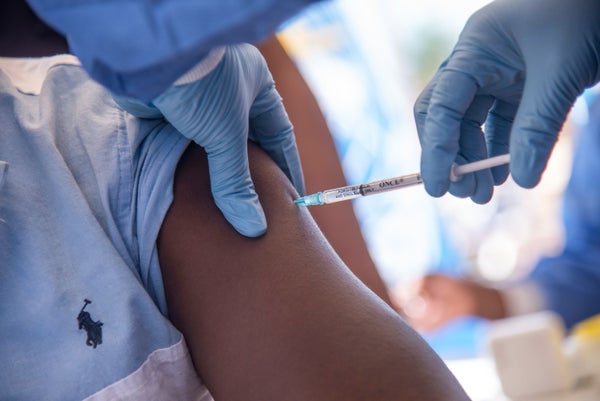This article was published in Scientific American’s former blog network and reflects the views of the author, not necessarily those of Scientific American
Headline after headline this past summer highlighted the importance of vaccines in the response to Ebola in the Democratic Republic of the Congo,the resurgence of measles globally and the increasing number of polio cases.
In moments of crisis like these, vaccines get their airtime, with greater appreciation shown toward their value as a public health tool. Yet behind the scenes, vaccines are having a huge impact on the health of people across the globe on a daily basis.
More than 200,000 people have been vaccinated against Ebola so far in response to the current outbreak. But to put this into perspective, more than one billion vaccine doses are administered worldwide every year;that’s more than 30 doses a second.They protect people against a whole host of deadly and debilitating diseases, from measles and polio to hepatitisand cervical cancer.
On supporting science journalism
If you're enjoying this article, consider supporting our award-winning journalism by subscribing. By purchasing a subscription you are helping to ensure the future of impactful stories about the discoveries and ideas shaping our world today.
The ubiquity of vaccines is, in part, thanks to our work at Gavi, the Vaccine Alliance,which launched in 2000 to redress a serious inequity in access. At the time, nearly 30 million children in low-income countries were not receiving vaccines that were widely available in the developed world. For instance, the vaccine against hepatitis B, a major cause of liver cancer,had been introduced nationally in 72 percent of high-income countries but in only 6 percent of low-income countries.
Nearly two decades later, the picture looks strikingly different.All low-income countries have introduced vaccination against hepatitis Bthrough the pentavalent vaccine,which also protects against four other potentially deadly infections: diphtheria, pertussis, tetanus andHaemophilusinfluenzae type b, or Hib.Basic vaccine coverage in Gavi-supported countries—the poorest in the world—has increased from around 59 percent to 81 percent, approaching the global average.
Gavi’s innovative public-private partnership model made this progress possible. The Alliance brings together UNICEF, the World Health Organization,the World Bankand the Bill & Melinda Gates Foundation with implementing countries, donor governments, vaccine manufacturers and private-sector partners to increase access to new and underused vaccines.Gavi pools demand by buying vaccines for 60 percent of the world’s children and secures predictable funding from donors, creating the incentive for manufacturers to make vaccines available at prices that low-income countries can afford.
And it works: The cost of immunizing a child with a full course of vaccines is just $27 in Gavi-supported countries, compared with around $1,100 in the U.S.It has also led to an increase in the number of manufacturers supplying Gavi from five when Gavi began to 17 today.
The aim is not just to increase access to vaccines but also to help countries build sustainable immunization systems. All countries are required to contribute some proportion of the vaccines that they introduce with Gavi support. Their share rises as their gross national income increases, until country governments are bearing the full cost of their vaccination programs.Currently, 15 countries have transitioned out of Gavi support and are fully funding their immunization programs, with three more expected by the end of the decade.
Through this country-led, collaborative approach, Gavi has helped vaccinate more than 760 million children since 2000, quietly saving more than 13 million lives.Yet widespread vaccination has an economic payoff, too. For every $1 invested in vaccines, Gavi-supported countries save $21 in health care costs and lost wages. This increases to $54 when we take into account the broader societal benefits.Once vaccinated, children have a better chance of performing well in school and becoming productive members of society, ultimately helping their national economies prosper.
Responding to outbreaks such as Ebola is a crucial element of Gavi’s work, but its support of routine immunization has the biggest impact. It will continue to be the focus of our work, as we strive to reach the millions of children in Gavi-supported countries who are still missing out on the most basic vaccines. Many of these children live in the most remote communities in the world, are falling through the cracks in rapidly growing cities or are among the unprecedented number of people displaced by conflict or natural disaster.
Of course, vaccines do not deliver themselves. So, we also invest in strengthening the health systems that deliver them. By expanding delivery to areas where children are not currently being reached, we are building out the basics of the primary health care system, which can then be used to deliver other important health interventions. This is an important part of progressive universalism toward ultimately universal health coverage.
Between 2021 and 2025, Gavi intends to reach more than 300 million additional children with vaccines, saving up to eight million additional lives.We’re aiming to accelerate the rollout of the human papillomavirus (HPV) vaccine, which protects girls against cervical cancer, in the countries that bear the greatest burden of the disease. We’re expanding the portfolio of vaccines that we support to 18, up from just six when Gavi launched nearly two decades ago.
As before, the complex and often courageous work that goes into delivering these results will occur largely beyond the international spotlight. But even if most of us do not see this work, we feel it. When we protect children from devastating diseases with vaccines, their families, communities, and countries and, indeed, the entire world reap the benefits.
I’m very proud that this has been recognized by the Lasker Foundation, which has bestowed on us the prestigious 2019 Lasker-Bloomberg Public Service Award,highlighting the momentous, everyday efforts of Gavi and its partners to increase access to vaccines in the world’s poorest countries. The Public Service Award—which recognizes major improvements in, and support for, medical research and public health—is one of the most gratifying validations of Gavi’s work and impact.
